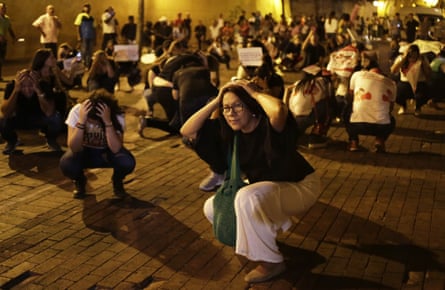Cartagena’s colonial architecture and easy access to white sand beaches have made it one of Colombia’s most popular tourist destinations. But behind its baroque facade, the historic city – which calls itself the “pride of Colombia” – has been hiding a shameful problem.
Sexual exploitation and abuse is out of control in the city, authorities have admitted, after coming under fire for not doing enough to tackle the issue. To counter the criticism, they launched a police crackdown and several court cases will begin next month.
Maria’s* attacker was jailed earlier this year. Now 19, she was raped at the age of 15. “He locked me in his car and threatened me with a gun. I had no choice,” she says.
Her attacker, Raúl Romero Pabón, filmed the assault before tattooing Maria with his initials under her left breast. “He threatened to send the video to my family and publish it on the internet if I refused to get a tattoo. It’s made me feel very dirty, but I refuse to let him own me.”
Maria came forward after she saw on television that Romero, a 34-year-old former navy captain, had been arrested. He had sexually assaulted several girls under 16 and had his name tattooed on their bodies.
Prosecutors say they register hundreds of cases of sexual exploitation of minors each year, but expect these figures to be the tip of the iceberg.
Romero was arrested along with 18 others in July as part of Operation Vesta, which authorities described as the largest police action against human trafficking and sexual exploitation in Colombia’s history.
Romero pleaded guilty and in October was sentenced to more than 21 years in prison.
Two Israeli citizens, Liad Tsukrel and Samuel Schraer, are due to stand trial in January, charged with sexually exploiting minors at sex parties in the popular Bocagrande district of the city on Colombia’s northern coast. Both deny the charges.
Last week, police arrested six other Israelis in coordinated raids around the country. Prosecutors say those arrested recruited underage girls for sex parties with visiting Israeli tourists.
The sex party industry is thriving in Cartagena, say insiders. On the internet several companies offer “sex tours” of the city, including a three-day trip for $6,000 (£4,700) that promises unlimited sex with up to 60 women on one of Cartagena’s private islands. Another pledges “days of sun” and “hours of fantasy fulfilment”, including a 25% discount to celebrate its 25th year of operation.
Cindy* is a 24-year-old sex worker who knows Cartagena’s sex-party scene first-hand. “Some are just huge parties. Other times it’s a competition. Groups of men compete to see how many of the girls they can find and then have sex with them,” she says. “They call it hunting.”
Cindy says it is impossible to know the ages of everyone involved, but admits that they include underage girls. “They earn a lot more. Clients pay more for them, but sometimes they can be scared. Often, they’re given drugs first or lots of alcohol to get them drunk. I think it makes it easier.”
Liliana del Carmen Campos Puello, 47, is also awaiting trial. Also known as “La Madame”, Campos has been called the “biggest pimp” in Colombia and is accused of trafficking girls and young women abroad and to Cartagena’s islands for sex.
“[La] Madame had 250 women under her control,” the chief prosecutor, Mario Gómez, told the Guardian. “She would send and manage these women to serve the sexual interests of large groups of men visiting Cartagena’s islands. She’d also send women abroad.”
Campos has told local media that the case against her is a “circus”.
Cindy says many women in Cartagena are not trafficked or enslaved, but choose to do sex work. “Whether people like it or not, it’s work. It’s a job,” she says. “Nobody forces me to do it.”
Away from the historic centre, in the poverty-stricken community of El Pozón, teenage girls are targets for recruiters. Like many, Paola*, 19, is harassed on social media. Since she was 14 she has received regular messages from fake model agents. They start with compliments about her looks, but soon get straight to the point.
“They offer me money for sex – 300,000 pesos for half an hour [£75] and half a million for an hour [£120],” she says.
Lina* received her first message last year, aged 15. “They’ve even offered me free plastic surgery. They say if I get operated on, I can charge more. They’re very persistent.”
Girls are not just pursued in cyberspace. Residents report that a white jeep with tinted windows regularly cruises the neighbourhood. “They stop us and offer castings,” says Lina. “It happened to me once, but I just ran away.”

The authorities say sophisticated organised criminal networks are behind Cartagena’s sex and child abuse industry.
“I’m scared something could happen to me,” says Paola. That’s why I don’t go out. I go to work, I go home and that’s it. I don’t go anywhere else.”
Lina says she understands why some in her neighbourhood succumb to the harassment and manipulation. “We’re poor here and they offer a way out. The money can be very tempting,” she says.
The local authorities in Cartagena declined to be interviewed. But Gómez says he believes recent arrests and upcoming trials will send a strong message that Cartagena is not a destination for paedophiles.
This is of little comfort to Maria. “It’s not just about tourism,” she says. “The Spanish built these walls to protect this city. But nobody protected me. I know I’ll have to watch my baby daughter like a hawk when she’s older. Life here is dangerous.”
*Names changed to protect identities
